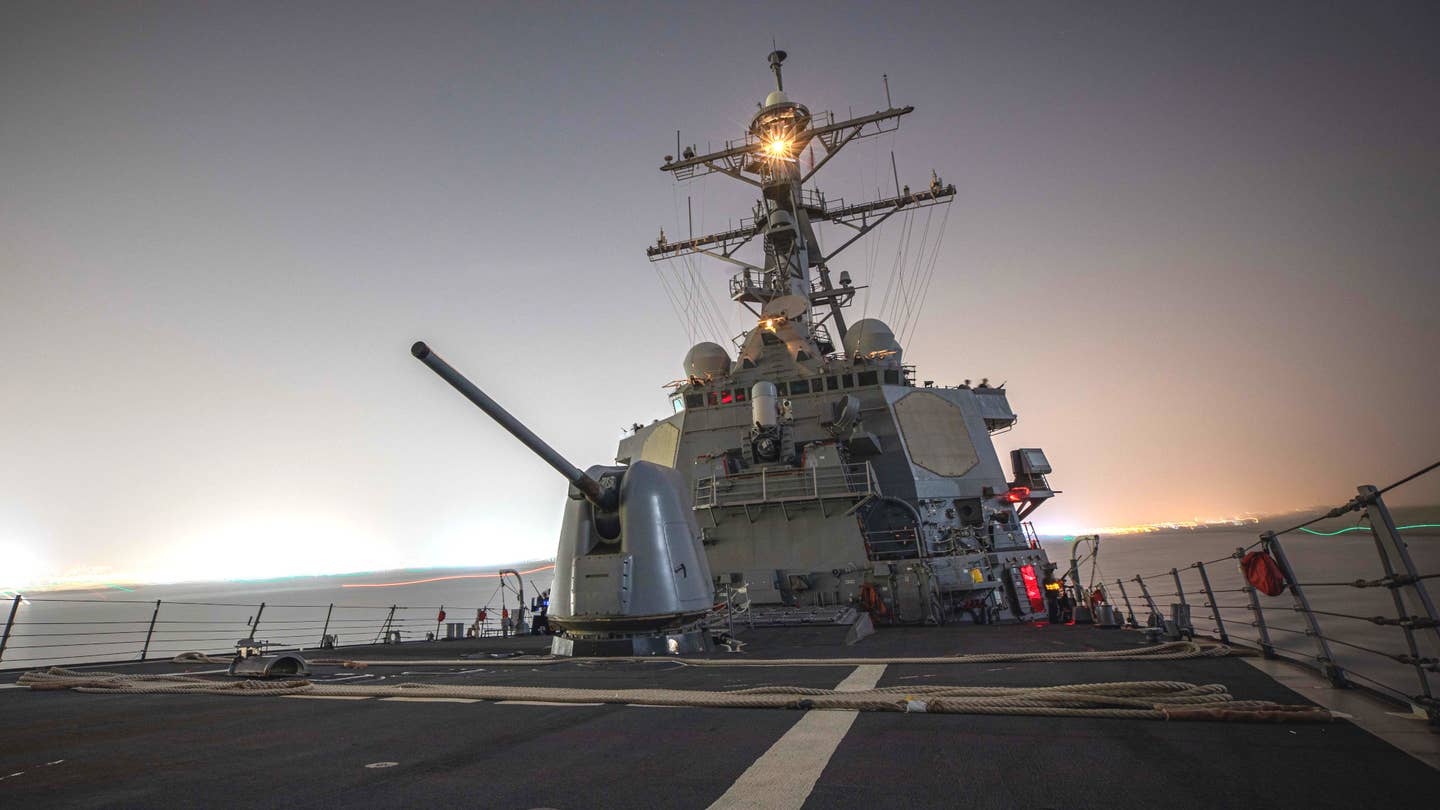The United States and nine other countries have joined together for Operation Prosperity Guardian as Houthi attacks continue unabated.

U.S. Secretary of Defense Lloyd J. Austin, who is on a tour of multiple countries in the Middle East, including Israel, made a formal statement about the launching of Operation Prosperity Guardian this evening. Just this past weekend, The War Zone highlighted the potential value of a multinational coalition in responding to the Houthi’s actions, and geopolitical complications in the region that could limit options for more direct retaliation.
The Prosperity Guardian coalition currently includes the United Kingdom, Bahrain, Canada, France, Italy, the Netherlands, Norway, the Seychelles, and Spain. What assets the U.S. military and the rest of these countries are contributing to this mission is unclear. Multiple U.S. Navy Arleigh Burke class destroyers have already been responding to Houthi attacks for weeks now. The USS Carney (DDG 64) alone has shot down dozens of Houthi drones and missiles since October.
The Arleigh Burke class destroyer USS Carney fires a surface-to-air missile during at a Houthi missile or drone while sailing in the Red Sea on October 19, 2023. USN
Warships from some of the other countries that are now part of the Prosperity Guardian coalition have engaged Houthi threats in the region already, too. The Royal Navy’s Type 45 destroyer HMS Diamond shot down a Houthi drone just over the weekend. France’s Aquitaine-class frigate Languedoc also shot down a drone launched by the Yemeni militant group earlier this month.
When it comes to the U.S. military, on top of the Arleigh Burkes, there has been a surge of other warships, including two whole carrier strike groups and an expeditionary strike group, into the region in the wake of Hamas’ brazen terrorist attacks on southern Israel that could contribute to this new operation. In addition to French and British warships, a host of other foreign naval forces are already in the region, too.
The Pentagon has said that these forces will be operating under the leadership of the existing U.S.-led Combined Task Force 153 (CTF 153). Established in April 2022, CTF 153’s main mission is to help bolster international maritime security efforts in and around the Red Sea, the Gulf of Aden, and the highly strategic Bab al-Mandab (also written Bab el-Mandeb) Strait that links them together.
“The recent escalation in reckless Houthi attacks originating from Yemen threatens the free flow of commerce, endangers innocent mariners, and violates international law,” Austin said in his statement. “The Red Sea is a critical waterway that has been essential to freedom of navigation and a major commercial corridor that facilitates international trade.”
“Countries that seek to uphold the foundational principle of freedom of navigation must come together to tackle the challenge posed by this non-state actor launching ballistic missiles and uncrewed aerial vehicles (UAVs) at merchant vessels from many nations lawfully transiting international waters,” Austin continued. “This is an international challenge that demands collective action.”
When asked, the Pentagon said it had no information to provide The War Zone whether or not Operation Prosperity Guardian would or could include a kinetic response of any kind directly against the Houthis.
Separately, U.S. Central Command (CENTCOM), the top U.S. military command in the Middle East, says that there were at least two Houthi attacks on commercial ships just today.
“On December 18, at approximately 9:00 (Sanaa time), there were two Houthi militant attacks against commercial shipping in the Southern Red Sea. The chemical/oil tanker motor vessel Swan Atlantic was attacked by a one-way attack drone and an anti-ship ballistic missile launched from a Houthi-controlled areas in Yemen,” according to a statement from CENTCOM. “At approximately the same time, the bulk cargo ship M/V Clara reported an explosion in the water near their location.”
“The Cayman Islands flagged Swan Atlantic reported impact on the vessel and requested assistance, the USS Carney … the closest U.S. warship, responded to assess damage,” CENTCOM added. “There was no request for support or report of damage [from M/V Clara]. There were no injuries reported during either incident.
The United Kingdom Maritime Trade Operations (UKMTO) office, which is managed by the Royal Navy, also issued notices about two separate reported attempted attacks on commercial ships by personnel in small boats in the region today. Whether these were Houthi-linked incidents or not is unclear.
One of these incidents occurred in or near the Bab al-Mandab on the Gulf of Aden side, and was said to have “likely [been] deterred by nearby coalition forces.”
The other reported incident occurred further to the north in or near the Bab al-Mandab on the Red Sea side. Armed security personnel on the ship involved in that altercation fired warning shots after which the small craft carrying armed individuals departed the area. Observers have separately noted what appears to be an uptick in commercial ships in the region announcing the presence of armed security teams onboard via their transponders.
UKMTO also reported a sighting of a pair of drones orbiting on the Gulf of Aden side of the Bab al-Mandab today, though who was operating them is unknown.
All of this speaks to the dangers commercial shipping currently faces while passing through the region, which has already been highly disruptive to international trade. In addition to an extensive arsenal of ballistic and cruise missiles and kamikaze drones, the Houthis have explosive-filled drone boats and naval mines that they could employ. The Houthis also used a Mi-8/Mi-17 Hip-series helicopter, along with small boats, to seize the Bahamian-flagged vehicle carrier ship Galaxy Leader in November.
The Bab al-Mandab is a crucial trade conduit, particularly for the shipment of oil and natural gas via sea. “Total oil shipments” via Bab al-Mandab, as well as the Suez Canal at the northern end of the Red Sea and the SUMED pipeline (which runs overland through Egypt from the Red Sea to the Mediterranean) “accounted for about 12% of total seaborne-traded oil in the first half of 2023, and liquefied natural gas (LNG) shipments accounted for about 8% of worldwide LNG trade,” according U.S. government statistics released earlier this month.
A map showing potential chokepoints around the Arabian Peninsula, including the Bab al-Mandab. U.S. Energy Information Administration
“Ships carrying oil from the Persian Gulf to Europe and North America can avoid the Bab el-Mandeb by traveling around the southern tip of Africa. The voyage from Fujairah, at the exit from the Persian Gulf, to Houston would increase by 2,660 nautical miles, or 28 percent. The distance to Rotterdam would rise by 4,800 nautical miles, or 78 percent, while a journey to Augusta in Italy would be nearly three times as long, at 10,860 nautical miles. The increased distances would add to shipping and fuel costs, and also disrupt supplies. A voyage from Saudi Arabia to Rotterdam takes about 22 days via the Bab el-Mandeb and Suez Canal, compared with 39 days around Africa, according to data compiled from Bloomberg tanker tracking.”
BP, a multinational oil and gas company headquartered in the United Kingdom, announced today that it would halt all oil shipments through the Red Sea in light of the current situation. Danish conglomerate Maersk, which includes the Maersk Line container shipping company, called for “political action” to resolve the situation swiftly in a statement to The War Zone after the Houthis fired a missile at the container ship Maersk Gibraltar (which thankfully missed) last week.
A number of other companies reportedly have or are considering curtailing their operation in the region in light of Houthi threats.
Exactly how the new U.S.-led maritime coalition may now affect the situation remains to be seen. Significant questions remain about its mandate and authorities, as well as whether its membership, which notably only includes one country (Bahrain) in the Middle East at present, may expand further in the coming weeks or months. The absence of Egypt, which has at least been part of CTF 153 in the past and stands to potentially lose billions of dollars in revenue if traffic through the Suez Canal plummets, is particularly pronounced.
What is clear, as now underlined by Operation Prosperity Guardian, is that the Houthis pose real threats to international shipping in and around the Red Sea and that the situation is becoming increasingly untenable.


